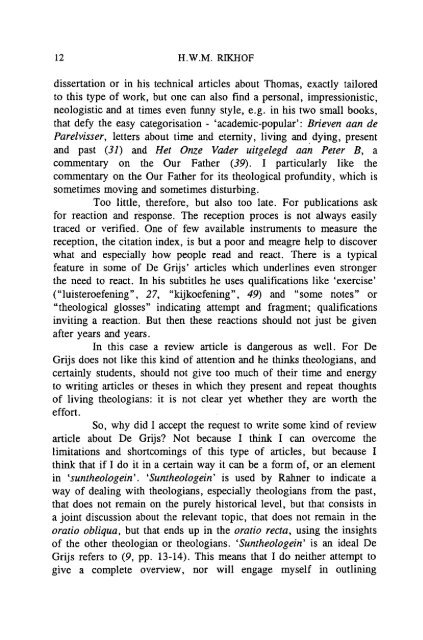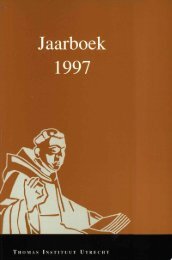Jaarboek Thomas Instituut 1995 - Thomas Instituut te Utrecht
Jaarboek Thomas Instituut 1995 - Thomas Instituut te Utrecht
Jaarboek Thomas Instituut 1995 - Thomas Instituut te Utrecht
You also want an ePaper? Increase the reach of your titles
YUMPU automatically turns print PDFs into web optimized ePapers that Google loves.
12 H.W.M. RIKHOF<br />
dissertation or in his <strong>te</strong>chnical articles about <strong>Thomas</strong>, exactly tailored<br />
to this type of work, but one can also find a personal, impressionistic,<br />
neologistic and at times even funny style, e.g. in his two small books,<br />
that defy the easy ca<strong>te</strong>gorisation - 'academic-popular': Brieven aan de<br />
Parelvisser, let<strong>te</strong>rs about time and e<strong>te</strong>rnity, living and. dying, present<br />
and past (31) and Het Onze Vader uitgelegd aan Pe<strong>te</strong>r B, a<br />
commentary on the Our Father (39). I particularly like the<br />
commentary on the Our Father for its theological profundity, which is<br />
sometimes moving and sometimes disturbing.<br />
Too little, therefore, but also too la<strong>te</strong>. For publications ask<br />
for reaction and response. The reception proces is not always easily<br />
traced or verified. One of few available instruments to measure the<br />
reception, the citation index, is but a poor and meagre help to discover<br />
what and especially how people read and react. There is a typical<br />
feature in some of De Grijs' articles which underlines even stronger<br />
the need to react. In his subtitles he uses qualifications like 'exercise'<br />
("luis<strong>te</strong>roefening" , 27, "kijkoefening" , 49) and "some no<strong>te</strong>s" or<br />
"theological glosses" indicating at<strong>te</strong>mpt and fragment; qualifications<br />
inviting a reaction. But then these reactions should not just be given<br />
af<strong>te</strong>r years and years.<br />
In this case a review article is dangerous as well. For De<br />
Grijs does not like this kind of at<strong>te</strong>ntion and he thinks theologians, and<br />
certainly students, should not give too much of their time and energy<br />
to writing articles or theses in which they present and repeat thoughts<br />
of living theologians: it is not clear yet whether they are worth the<br />
effort.<br />
So, why did I accept the request to wri<strong>te</strong> some kind of review<br />
article about De Grijs? Not because I think I can overcome the<br />
limitations and shortcomings of this type of articles, but because I<br />
think that if I do it in a certain way it can be a form of, or an element<br />
in 'suntheologein': 'Suntheologein' is used by Rahner to indica<strong>te</strong> a<br />
way of dealing with theologians, especially theologians from the past,<br />
that does not remain on the purely historical level, but that consists in<br />
a joint discussion about the relevant topic, that does not remain in the<br />
oratio obliqua, but that ends up in the oratio recta, using the insights<br />
of the other theologian or theologians. 'Suntheologein' is an ideal De<br />
Grijs refers to (9, pp. 13-14). This means that I do neither at<strong>te</strong>mpt to<br />
give a comple<strong>te</strong> overview, nor will engage myself in outlining








